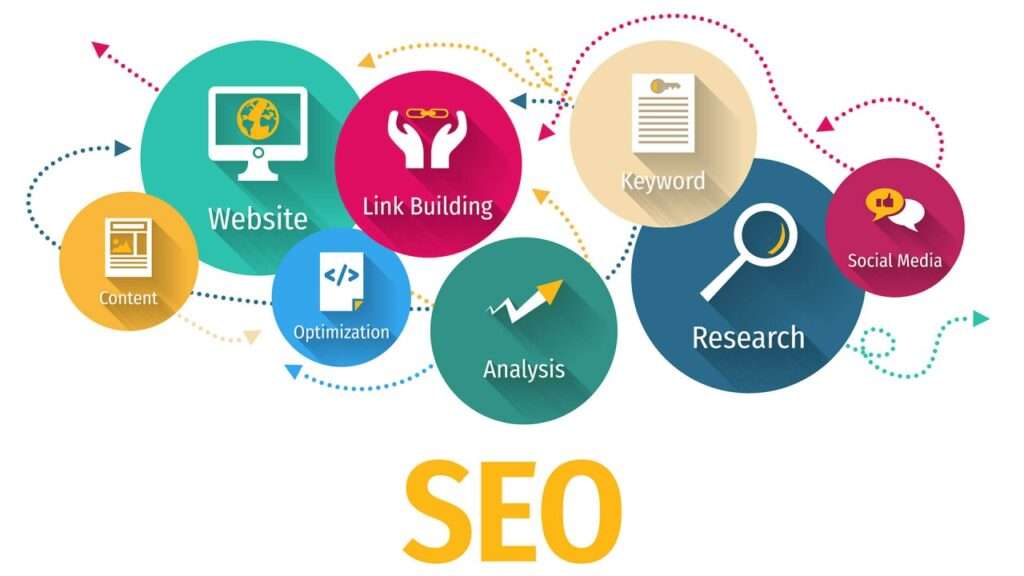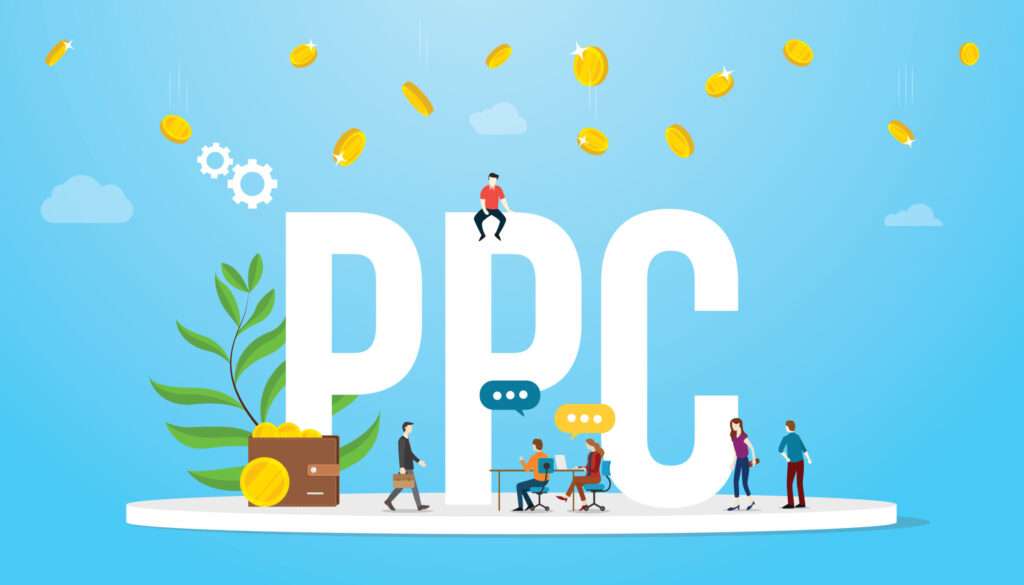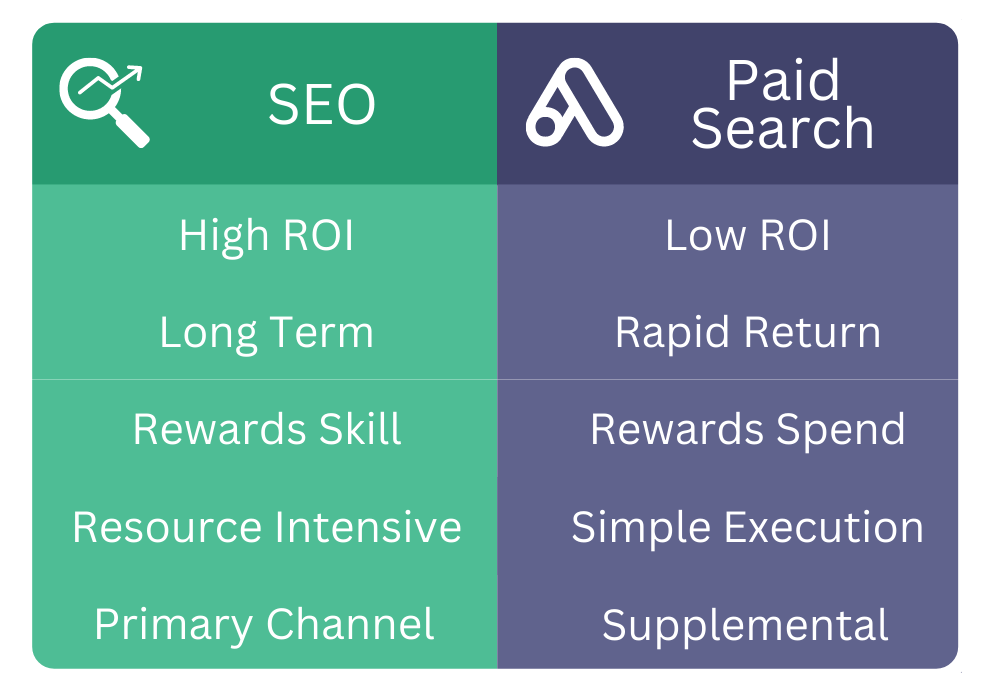Summary: In the blog “PPC vs. SEO: Which Strategy is Right for Your Business?” We discuss the fundamental differences between SEO and PPC. SEO is inexpensive and promotes long-term trust, whereas PPC provides fast results and targeted reach. Combining both techniques is good since it gives rapid traffic and long-term brand visibility, keeping your firm competitive in the digital market.
In 2024, maintaining a strong online presence is critical for remaining ahead of the competition. Pay-Per-Click (PPC) and Search Engine Optimization (SEO) are two prominent digital marketing strategies for increasing visibility and driving traffic to your organization. However, the argument over which method is best for your organization is ongoing. In this blog, we will dissect these two strategies, weighing both their pros and cons to help you decide which is best for your organization.
Table of Contents:
- SEO: How It Helps Your Website Rank Higher
- PPC: How It Drives Immediate Traffic to Your Website
- Where Should You Invest: SEO, PPC, or Both?

SEO: How It Helps Your Website Rank Higher
Search Engine Optimization (SEO) improves your website’s ranking on search engine results pages (SERPs) by optimizing elements such as content, site structure, and backlinks. Google and other search engines crawl websites and categorize and rank them using complicated algorithms, therefore SEO is critical for increasing organic traffic.
A recent BrightEdge study discovered that 68% of all online experiences—roughly 4.5 billion users—begin with a search engine, emphasizing the necessity of a solid SEO approach. Let’s look at the pros and cons of SEO to see if it fits with your business objectives.
“SEO, in a nutshell, is the art and science of pleasing search engines.” – Neil Patel
Pros:
- Cost-Effectiveness: When taking into account long-term advantages, SEO is more cost-effective than PPC. Link-building, technological optimization, and content production are all investments that must be made. 90.63% of web pages receive no organic traffic from Google, according to an Ahrefs study, highlighting the importance of having a solid SEO strategy.
- Organic Traffic: Once your website achieves a higher rank in search engine results, SEO can help drive traffic over time without the need for continuous investment. Research by HubSpot indicates that 70% of marketers see SEO as more effective than PPC in driving organic traffic.
- Reliability and Trust: Websites that rank higher in search engines are more likely to be trusted by customers, which can increase brand awareness and help you carve out a solid niche for yourself in your target market.
- ROI: As per a Search Engine Journal study, 49% of marketers claim that organic search has the highest return on investment out of all the marketing channels. SEO ROI offers substantial long-term benefits, despite the fact that it may initially be difficult to measure.
Cons:
- Long-Term Plan: SEO is mostly a long-term plan. Even if it produces organic and sustained traffic, noticeable outcomes could not appear for several months. Moz claims that for long-term lead creation, SEO is 5.66 times more successful than sponsored search ads.
- Ongoing Maintenance: While SEO has no initial costs, it does require continuous maintenance over time, which may result in increased costs as your plan changes.
- No Promise: Even with appropriate optimization, there is no guarantee of attaining high rankings because of the fierce competition in SEO.
PPC: How It Drives Immediate Traffic to Your Website

In contrast, Pay-Per-Click (PPC) is a paid digital marketing tactic that entails the placement of advertisements, typically in premium top positions, on search engines and other platforms. Businesses pay a charge each time an ad is clicked, resulting in instant traffic to their websites. PPC ad expenditures can be significant depending on the keywords, but according to WordStream, visitors are 50% more likely to make a purchase than organic visits. Let’s examine PPC’s pros and cons to see if it fits with your company’s objectives.
“PPC is a good way to drive traffic to your website, but it can also help you to reach new customers and explore new opportunities.” – Zeitzan Palazli SEO and PPC executive.
Pros:
- Immediate Impact: PPC campaigns advertise deals and merchandise as soon as they go online, which produces instantaneous results. During busy times and promotional events, this prompt reaction is very helpful. Within the first three months of initiating a PPC campaign, firms can receive a 200% return on investment (ROI), according to WordStream.
- Audience targeting: PPC gives you a wide range of targeting choices, so you may customize advertising according to areas, interests, demographics, and even times of day. By ensuring that your intended demographic sees your advertisements, you can create well-targeted campaigns that have greater conversion rates.
- ROI Measurement: Because PPC offers real-time performance details for every campaign, ad group, and keyword, measuring ROI is more flexible. Using these information, you can immediately modify it. Businesses make an average of $2 for every $1 spent on Google AdWords, according to a WebFX research, however industry-specific variations may occur.
- Flexibility: PPC advertising provide a great deal of freedom. You can modify or halt your PPC advertising at any moment to conform to consumer needs or market trends after reviewing campaign performance. For organizations to remain flexible in the fast-paced digital economy, this ability to adapt is essential.
Cons:
- Expensive: PPC campaigns may be expensive, especially in cutthroat markets where keyword costs can reach up to $50 per hit. According to Google Ads data, the average cost per click on the search network is $2.69 for all industries combined.
- Continuous Investment: Pay-per-click advertising is a continuous operation; as soon as you cease funding, your sponsored links and the traffic they produce will vanish from search engine rankings. Constant investment is required to keep PPC traffic and visibility high.
- Ad Avoidance: As more consumers choose paid versions of apps and services in 2024 in order to completely escape advertisements, PPC click-through rates (CTR) will be lower than those of organic search results. According to a Statista survey, the use of ad-blockers increased by 10% in the previous year, which could eventually reduce the effectiveness of PPC.

Where Should You Invest: SEO, PPC, or Both?
- SEO is a better choice if you have a limited budget and want to create content and build brand awareness to get long-term, consistent results. Over time, it raises the perceived value of your website among users and boosts revenue.
- However, PPC can assist you if you require a quicker fix to increase traffic, particularly during busy times of the year or to target particular markets for certain goods or services. PPC enables fast conversion maximization and accurate audience segmentation.
- A further successful tactic is to combine PPC with SEO. Because both of these strategies deliver different outcomes, combining them can increase traffic instantly through PPC and establish a brand’s credibility and visibility over time through SEO. Businesses who run both SEO and PPC ads experience an average of 89% additional traffic, according to a Google study. With its blend of high-quality content and visitors that may not necessarily convert right away, this combination increases your visibility and builds your brand overall.
Final Thoughts
Evaluate the short- and long-term objectives of your company before choosing between SEO and PPC. Businesses aiming for long-term success will find SEO to be a perfect tool as it has the capacity to gradually develop organic traffic and brand credibility. On the other hand, PPC is a fantastic option for companies trying to maximize conversions and swiftly drive traffic during crucial times because it provides precision targeting and immediate results.
Combining the two techniques can provide you with the best of both worlds, resulting in immediate traffic and ongoing brand exposure. Combining SEO and PPC can provide you with a more comprehensive digital marketing plan and ensure that your firm is well-positioned for current and future success.

